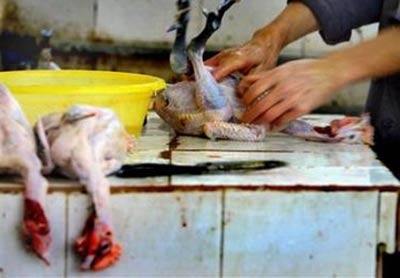|
New bird flu outbreak in China reined in
(AFP/China Daily)
Updated: 2005-10-26 05:41
In addition to quarantines and other precautions, veterinary workers have
vaccinated 140,000 birds with inactivated mono H5N2 vaccine.

A Chinese vendor cleans a slaughtered chicken
at a market in Nanjing, in east China's Jiangsu province, October 22,
2005. [newsphoto] |
Elsewhere in the world, Indonesian health authorities yesterday confirmed the
country's fourth human death from bird flu, bringing the worldwide toll to 62.
The World Health Organization said in a statement that the newly-confirmed
case was a 23-year-old man who was hospitalized on September 28 and died two
days later.
Meanwhile, China's need for anti-flu medication cannot be met soon even
though Swiss drug-maker Roche has voiced willingness to work with the Chinese
Government to produce Tamiflu, which according to tests is effective against
bird flu in humans.
"We are open to discussion with any partner from a government or private
company which has the capacity to produce substantial amounts of Tamiflu for
pandemic use in a timely manner in accordance with appropriate quality
specifications, safety and regulatory guidelines," the company's Shanghai office
told China Daily
But it has yet to make any significant effort in producing Tamiflu in China.
The company reiterated that the production process is complicated, even though a
basic material, shikimic acid, is extracted from a traditional Chinese medicine
called Star Anise.
Sources at the Ministry of Health told China Daily recently that the
authorities had negotiated with Roche over the production of Tamiflu, but the
company would not give up rights to its patent, which is reportedly protected
until 2016.
Also, given a global shortage of the drug, Chinese authorities are reluctant
to declare the quantity in stock for fear of causing a public panic.
(China Daily 10/26/2005 page1)
|